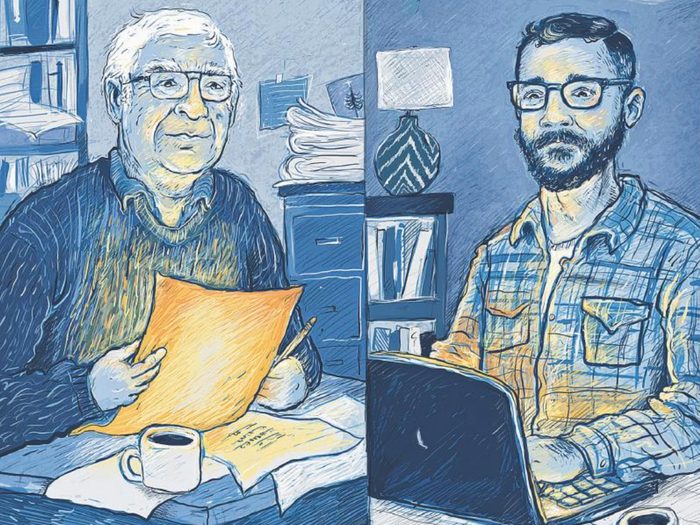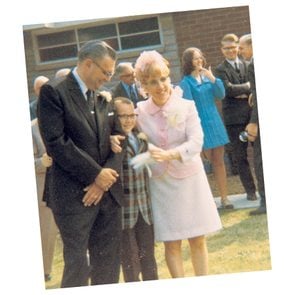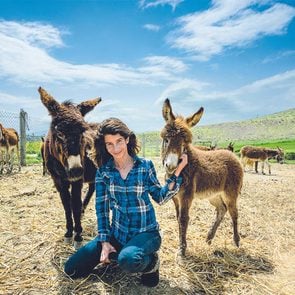I Never Knew How to Communicate With My Dad—Until I Wrote Him an Email

It’s hard to talk to dads sometimes. The roles we often expect our fathers to play—protector, provider—can make them seem impenetrable. For me, that all changed with a single email.
My dad was never much of a talker. He held his cards pretty close to his chest—so to speak, because he never gambled. He rarely drank, so we didn’t get to see him loosen up after a few beers. He didn’t tell stories about himself at the dinner table or when we went for walks in the park. He was a private person and seemed to want to stay that way.
Bringing up the many questions I had about life before I was born—his early hopes and dreams, loves and heartbreaks—let alone sharing my own feelings, felt like too much for us to handle. I didn’t want to threaten the integrity of his hard shell. I had gotten used to it, and it made me feel secure.
But when my relationship and career simultaneously took a hit a year ago, things had to change. I needed my dad to pull back the curtain so I could see him as mortal. I was facing serious questions about my own nature, and I wanted to know that he had faced them, too. I needed to know how he had found his way, because I felt like I had lost mine.
In an acute moment of desperation, it occurred to me that sending an email might be the key. An email can be crafted slowly and carefully. I could speak at a comfortable distance and give him room to adjust. He’d be up in his office—his “cubbyhole,” in my mom’s words—a comfy fortress of junk filled with bookshelves, dusty CD-ROMs and stacks of old newspapers. I’d be at my desk in a basement apartment 20 minutes away, in downtown Toronto.
So I wrote him a message. I told him about my regrets and fears, and I asked him to answer, if he felt like it, and to share something about himself, something that would give me much-needed perspective on both of our lives.
Two weeks later, it showed up in my inbox: a scanned, three-page, point-form document with the title handwritten in my father’s distinctive all caps: “GIRLS I LIKED, BY LUIGI C.” Dad, a 68-year-old retired Nortel technologist and grandfather of four, had carefully considered my message, reached back into his memory and crafted a response—his history of love, longing, self-doubt, struggle and perseverance.
I learned about girl No. 1 (already one more girl than I had ever imagined), Angela Scattarelli, who used to live next door to him. “Sicilian” was written in brackets beside her name. He had “tried but never really had enough gumption” to ask her out. More than 40 years later, she still made the list.
There were girls from his days as a stock boy at a grocery store in Toronto’s east end, like Michelle, an “English” cashier. Dad wrote, “When they rang the bell for bag packers, I tried to go to her first.” He had his first kiss with Michelle—after a few dates in his father’s Beaumont—but lost out when she decided to reconnect with an old boyfriend. Still, progress!
After a few more “English” girls, he went back to dating “paisans.” I got the sense that it must have been difficult for my dad to date outside of his culture. Even though he came to Canada at the age of 10, he had settled in an immigrant community. The few friends he had were mostly Italian, and families would spend a lot of time visiting relatives in the evenings and on weekends. With the “English” girls, the culture shock must have gone both ways.
Some of the Italian girls appeared as just first or last names, along with scant details. The fates of these women ranged from comic (“Later saw her at a wedding party, married to a tall dude”) to tragic (“She went back to Italy to marry; we found out later she had died in childbirth”).
Then, the final entry, No. 10: Antonietta Larocca. She got the most space, with details about how they had met (“through my Aunt Antonietta and Uncle Rocco”), what they had done (on one date, a screening of Play It Again, Sam) and the “many telephone calls from the Old Mill subway station after work.” The list ended with an enthusiastic bullet point: “Antonietta and I prospered from our union. Here we are in 2014 and still in love!!!”
I had never doubted my parents’ bond. It was there in the kiss they shared when exchanging Christmas cards (the only kiss we’d get to witness all year) or in the way they could smile at something the other had said, even while arguing. But it was seeing their love in writing, his writing—and in the context of a life that could have followed one of the many roads not taken on Dad’s list—that gave me courage.
I closed the email and started to cry. I cried because I wished I had opened up earlier but was grateful it wasn’t too late, and because I thought I knew him and now realized there was so much I hadn’t discovered. I cried because it felt as if I hadn’t been able to ask him anything of consequence about his life in all this time; instead, I had focused on not sharing anything about myself with him. I cried because at 33, in the midst of my own struggles, his letter instantly put me at ease. And I cried because in the end, it was so simple: I just had to hit “Send.”
We’ve since had many email exchanges. I’ve asked about his childhood and his relationship with his own parents. Some days I can even ask my dad questions face to face without getting a lump in my throat. Better yet, he occasionally offers up stories without me asking, like the one about the time he and his friend Antonio skipped school to see a movie (they got caught the next day when Antonio spilled the beans).
And I’m talking more, too. My problems haven’t been magically solved, but getting to know my dad better—and learning to love him more—has made the tough stuff more manageable and life sweeter.
It’s hard to talk to dads sometimes. I’m glad I found a way to talk to mine.
Next, read the heartwarming story of how one man reconnected with his mother.






